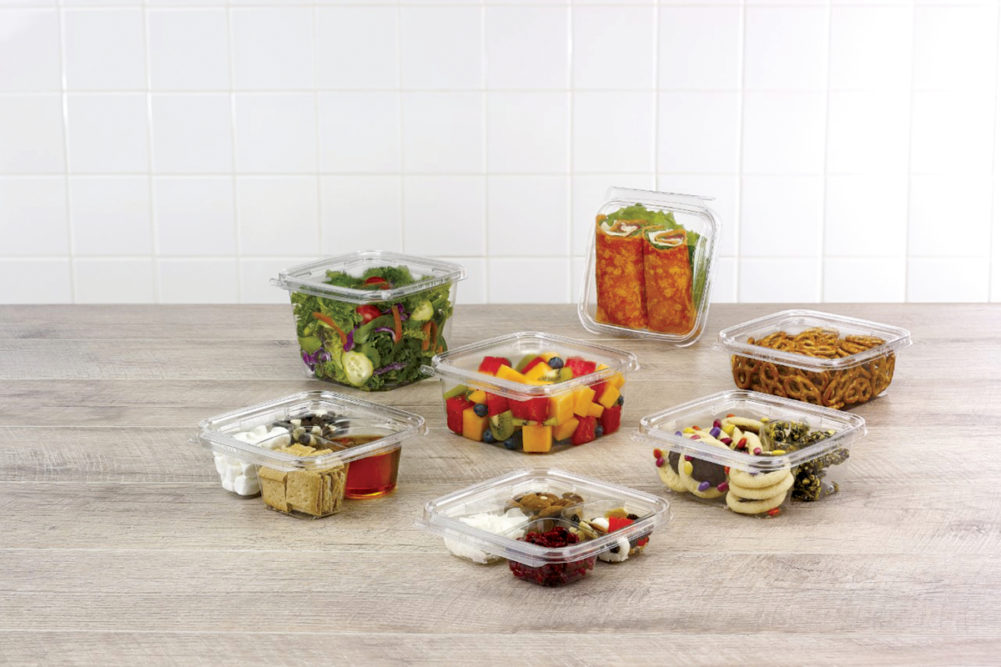KANSAS CITY, MO. - Now more than ever, tamper-evident packaging is at the top of grocery retailers’ minds. And many are leaning more on commissaries, central kitchens and other off-site facilities to supply tamper-evident sandwiches, wraps, salads and other foods.
When the coronavirus hit, St. Paul, Minn.-based Nextera Packaging saw an initial drop in demand from commissaries and central kitchens for the company’s tamper-evident packaging, but it’s been steadily climbing back up since then, said Scott VanderWerf, vice president of sales and marketing.
That continues an overall trend of stronger demand from commissaries and other off-site facilities that supply retail, and for tamper-evident grocery retail packaging in general.
“Stores have pivoted from open air self-serve to pre-packaged, pre-portioned product,” VanderWerf said. “That is a trend that we do not see changing for the foreseeable future.”
Retail stores, he added, are acutely aware that they cannot achieve the same food safety standards that off-site commissaries and co-packers achieve. As a result, Nextera anticipates increased demand for retailers outsourcing the food packing to processors and co-packers.
“Given the current environment, the demand for tamper evident packaging has increased substantially at virtually all operations serving packaged foods,” said Cindy Blish, associated brand and communications manager for Shelton, Conn.-based Inline Plastics. “Sales were substantially higher overall than prior months when stay at home orders went into effect, and that was across all of the Safe-T-Fresh tamper-evident product lines.”
Consumers are especially wary of purchasing bulk food items, with how many hands have touched the food across the supply chain, Blish said. And when it comes to fresh-cut fruit and vegetables, consumers will choose food packaged in tamper-evident containers.
Trending in the “new normal”
Even after the pandemic passes, the trend toward more and more tamper-evident packaging will continue to be strong, Blish said, and commissaries and other third-party suppliers of prepared and other foods to grocery retail will play a vital role.
“In some cities, restaurants are starting to open up commissary kitchens to specifically deal with servicing online delivery orders,” she said. “This is another way to streamline the process and gives restaurants an alternative means to service their customers. Commissaries in general will become a continued resource to deliver safe, secure food options.
As bulk food merchandising and serve-yourself buffets have been shut down at grocery stores and at colleges and universities, the desire for pre-packaged foods has changed how food will be sold, both short and long term, Blish said.
“The concern for the health and wellness of consumers is being addressed through packaging, with pre-packaged meals as an example. The fewer hands that touch the food, the more assurance that the consumer will have in the safety of the product.”
Inline makes tamper-evident packaging specifically for individual wraps, sandwiches and hoagies. The company also offers a host of options for fresh salads and cut fruit with its Rectangles, PagodaWare and SnackWare lines – all of which are Safe-T-Fresh brand tamper-evident.
Nextera offers a wide variety of tamper-evident containers for sandwiches, salads, wraps, salads, and other prepared foods. The company is a leading supplier of recyclable fresh-cut produce packaging and fruit packaging as well as deli bakery packaging.
Nextera is tapping into a clear trend toward smooth sidewalls, clean lines and the elimination of ribbing in the design of packaging, VanderWerf said.
“The consumer wants to see an undistorted view of the product,” he said. “There’s also a trend to move from black to clear containers to give a transparent view of the bottom of the product as well as more successful optic scanning in the one-sort recycling facilities.”
Last but certainly not least, tamper-evident packaging used to pack sandwiches and other value-added foods in commissaries is trending toward increased use of eco-friendly materials such as fiber and sugar cane-based materials. One problem with that trend, however, is that fiber and sugar cane items are often significantly more expensive, result in increased food spoilage, and are not typically recycled by the end consumer, VanderWerf said.
Looking ahead, Nextera is keeping its focus where it’s always been: on the fact that the choice of packaging is critical and can increase eye appeal and impulse sales, VanderWerf said.
“Tamper evidency is here to stay due to food safety concerns at retail,” he added. “Consideration for shelf yield, reduction of shrink spoilage, quality of package security, recyclability and package design should be priorities for the smart retailer.”
This story is from the July 2020 issue of Supermarket Perimeter. To view the full magazine, click here.

